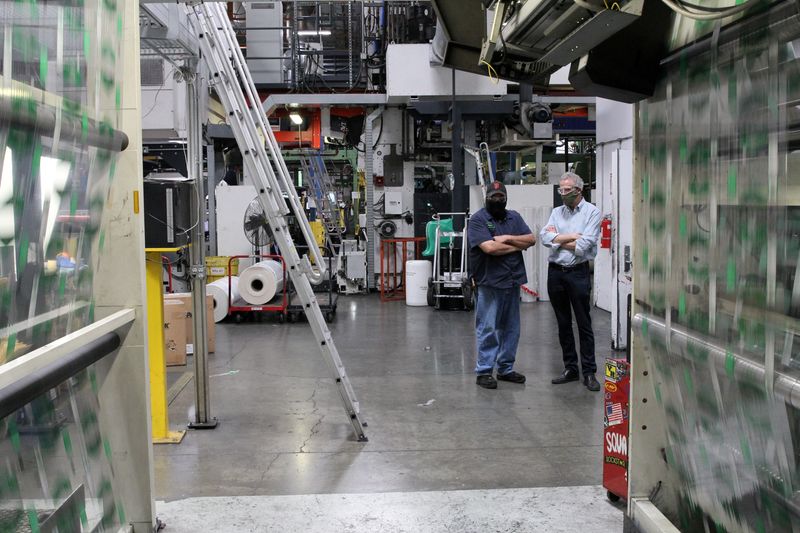By Timothy Aeppel
(Reuters) - Drew Greenblatt loves that the Federal Reserve has cut interest rates.
But the half-point reduction, the first in what is expected to be a series of cuts, won’t help him win what he calls the "trench warfare" he’s fighting with one of his big customers.
That buyer moved work out of China during the COVID-19 pandemic - placing about $800,000 in orders at Greenblatt's small U.S. factory last year. Greenblatt bought robots and hired more workers to meet the new demand. Then orders stopped earlier this year.
"When I asked why, they said they’d gone back to China, to save money," said Greenblatt, president of Marlin Steel, a Baltimore-based maker of highly engineered wire baskets used in industrial and laboratory machines.
Greenblatt’s problem underscores headwinds facing U.S. producers that lower interest rates won’t alleviate, including supply chain snarls, stubbornly high prices for many raw materials, simmering labor unrest in some sectors, and especially, China.
U.S. Vice President Kamala Harris plans to roll out new economic policies on Wednesday that aim to help Americans build wealth, and set economic incentives for businesses to aid that goal, Reuters reported. The new policies come as undecided voters seek more information about how Harris would help them economically if she were elected president, the sources said.
A key issue in the Nov. 5 election is how Harris and former President Donald Trump plan to respond to the competitive challenge posed by China. The Biden administration has proposed prohibiting key Chinese software and hardware in connected vehicles on American roads due to national security concerns.
Greenblatt, the basket manufacturer, is hoping for more aggressive action on trade, and not just against China.
"If they put on more tariffs, we'd have more shipments to our clients," he said. "Instead, our clients are buying from countries that allowed their currencies to be subsidized."
'CHALLENGING PICTURE'
High interest rates make it costlier to borrow or fund ongoing operations and are often cited as a leading contributor to the broad slowdown at U.S. factories since early last year. After adding nearly 750,000 jobs in 2021 and 2022, U.S. manufacturers have shed about 7,000 jobs in 2023 and so far this year, according to the Labor Department.
Production at U.S. factories surged in August, according to the Federal Reserve, amid a rebound in motor vehicle production, but data for July was revised lower, suggesting that manufacturing continued to tread water.
A report last week from the Philadelphia Fed, meanwhile, pointed to rising supply chain aggravations and a pickup in input costs hitting factories in their region in September.
"What the Fed can do is create expectations for short-term growth with a rate cut, which is powerful," said Cliff Waldman, CEO of New World Economics, an economic consulting firm in Washington that focuses on the industrial sector. Lower rates could encourage companies to move forward with new capital projects.
"But that’s really only a small part of the challenging picture facing U.S. manufacturing," Waldman said.
He noted that many producers continue to battle one another over who will absorb the higher costs due to inflation. Add to this the disruption of global supply chains during the pandemic, which is still playing out.
THE UNEXPECTED
For Kevin Kelly, the latest headache is an unexpected surge in electricity prices. Emerald Packaging (NYSE:PKG), his family-run business, makes plastic bags for produce companies at its factory outside San Francisco and uses large amounts of power to run huge printing presses that put labels and images onto the bags.
Kelly said his power bill in June jumped to $350,000 from $290,000 the month before because of higher-than-expected summer rates. "We just didn’t see that coming," he said. "We knew there were increases coming through and that the summer rates would be expensive, but we didn’t realize they’d be that expensive."
Utility rates in California are the second-highest in the U.S. after Hawaii, driven up in part by the cost of reinforcing the state's power grid against wildfires.
Kelly is rushing to install solar panels that should help offset some of those increases, albeit after the hefty cost of installing the system. He has also altered the factory’s work schedule, shutting the big machines down for two hours late in the day when rates are highest.

"We have people cleaning the presses, doing odd labor around the plant during those two hours, so people are working, but it’s still reduced our output," he said.
Another jolt could come from a major strike at East Coast and Gulf of Mexico ports, which could hit on Oct. 1. Anything on the water now could get stuck on ships and force manufacturers to scramble for alternative ways to move goods, further adding to costs.